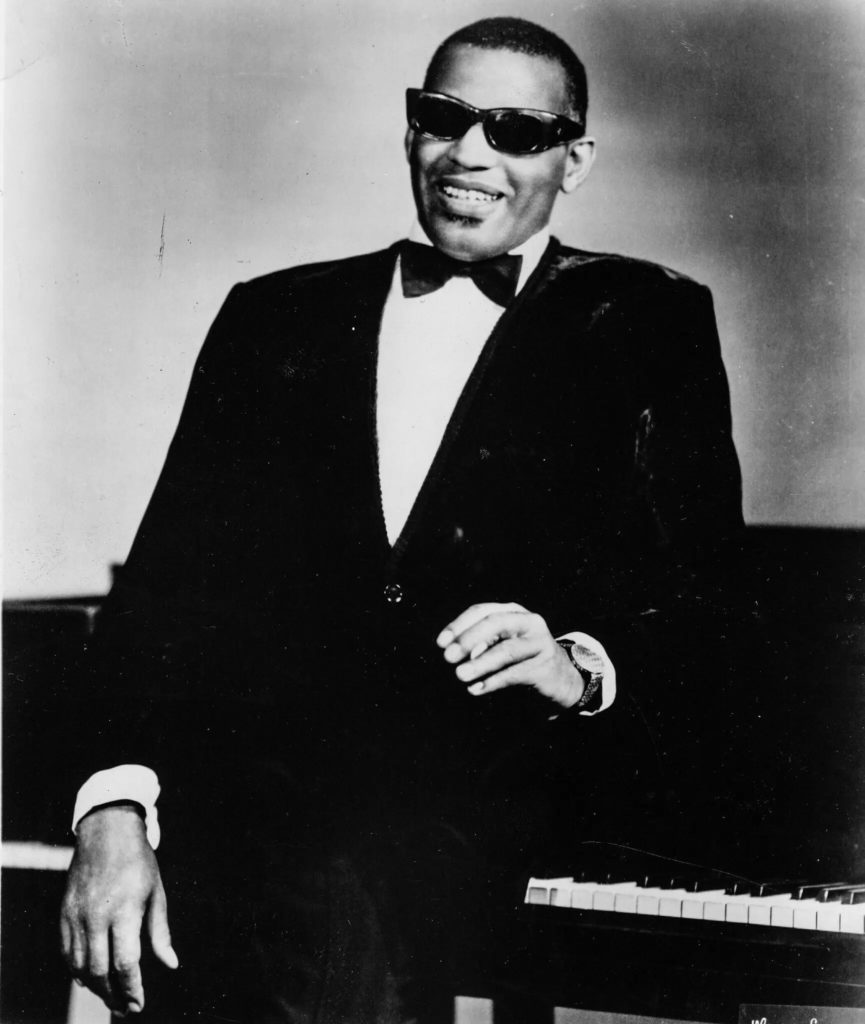Ray Charles broke down many barriers both as a musician and an African American. He defied genre categorization and frequently intertwined R&B, pop, gospel, and country music in various combinations. Charles also lent his voice to the civil rights movement: he provided financial support to Dr. Martin Luther King, Jr., and even refused to play for segregated concerts. However, not much has been written on Charles’ advocacy for people with disabilities. Perhaps that’s in part because he disregarded his own disability; he stalwartly refused to let it limit him.
Before Charles was born, many blind African American musicians established national reputations, including pianists Blind Tom Wiggins and singer-guitarist Blind Lemon Jefferson. However, the word “blind” functioned as a professional nickname used to market and exploit their disability. Adding the word “blind” to these musicians’ names served to make them stereotyped “others.” One form of a “blindness myth,” Joseph Witek observed, “is that of the suffering blues singer begging with a tin cup. This formulation casts blindness as the mark of a cruel fate which caps the singer’s degradation and alienates him from his community.”
Charles was born in a time when blind and visual impairment was becoming less common in the United States. To maintain Jim Crow laws and practices, southern African Americans were not offered consistent health care, but white physicians began to prognose African Americans, as they knew it could be useful for the general population.
Charles himself was not born blind, but slowly started losing his vision at the age of four, due to what was later diagnosed as glaucoma. While neighbors in Charles’s hometown of Greenville, Florida pitied the boy, Charles’ mother Retha had no patience for sympathy. Charles later recounts that, “When I got to feeling sorry for myself, she’d get tough and say, ‘You’re blind, you ain’t dumb; you lost your sight, not your mind.’ And she’d make me. . .see I could do almost anything anyone else could do.” This determination and rejection of his blindness stuck with Charles for the rest of his life.
In 1937, the seven-year old Charles was sent to St. Augustine, Florida to attend what was then known as the Florida School for the Deaf and Blind. The school was strictly segregated, dividing males and females as well as African Americans and whites. It was at this school that Charles discovered his love for music.
At the school, Charles not only learned braille and sign language as a means of communicating with the deaf children, but also braille music. When Louis Braille first invented the system of raised dots that could be read by fingertip in 1824, he soon later devised braille music. This code still used the braille dots, but had its own entirely separate meaning. However, reading braille music posed difficulties, as Charles had to play the piano with his left-hand while reading with his right, and then switch positions to learn the keys on the other hand. Because of this arduousness, Charles would just memorize a song by heart instead of going back to read the score.
That same year of 1937, Charles became completely blind, as his right eye was removed due to its painfulness. But Charles tried to distance himself from the tradition of blind African American singers before him. Charles refused to play a guitar because, “Seems like every blind blues singer I’d heard about was playing a guitar.” Furthermore, though blind and visually impaired individuals’ use of a white cane had become standard by the 1930s, and in fact was a powerful symbol of independence for many, Charles refused to use the device.
After experiencing chronic ear troubles leading to temporary hearing loss, Charles incorporated the Robinson Foundation for Hearing Disorders in 1986. His foundation provided cochlear implants for low-income patients as well as funding towards research for hearing improvements. Through his foundation as well as determination to not let his blindness disable him, Charles broke down expectations and stereotypes for disabilities. In fact in 1994, Charles was honored with the Helen Keller Personal Achievement Award, which celebrates individuals who have improved the lives of disabled peoples.
Ray Charles let everyone know that a disability may slow you down, but you keep moving forward. Fight for what you believe and want in life. Follow your dreams and take care of your family.
Source: Smithsonian Music
